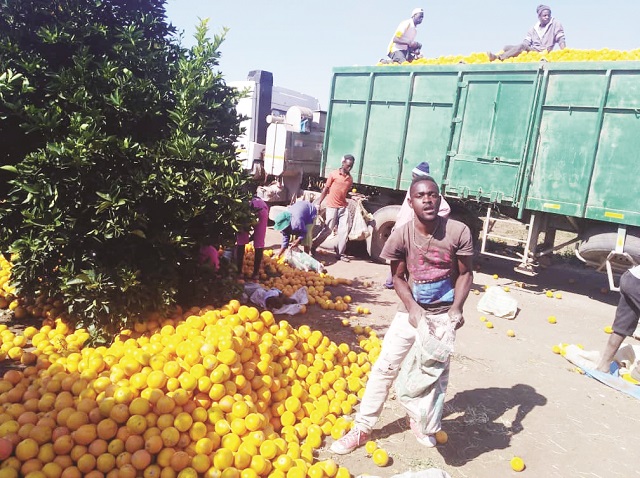Beit Bridge Juicing targets $18m revenue

Farm workers harvest and load fresh oranges into a truck at Shashe Irrigation Scheme in Beitbridge yesterday
Prosper Ndlovu in Beitbridge
SCHWEPPES subsidiary Beit Bridge Juicing (BBJ) Private Limited has set a target of crushing 25 500 tonnes of oranges and generating above $17,5 million revenue by year end on the back of improved fresh fruit supply by local citrus farmers.
Last year the Beitbridge-based firm processed about 16 000 tonnes, which it has already surpassed so far.
The company derives the bulk of its raw orange fruit from local commercial farmers in the district and small-holder farmers under the successful irrigation scheme model, mainly in Shashe area.
BBJ manager, Mr Charles Tembo, told journalists during a media tour of the processing plant here that their ambitious output target this year was feasible given the positive fruit production by the local farming community.
“We have a target of processing 25 500 metric tonnes of oranges in 2018. As a business we want to deliver gross revenue of $17,5 million this year,” said Mr Tembo. The company has a total of 180 workers, 77 permanent and 103 on contract terms.
The media team was taken on a tour of the facility to appreciate the entire production process from fruit delivery from the farmer, storage, sorting, washing, sizing, crushing, separation, concentration, blending and finally to drumming, a stage in which the juice product will be ready for sale to different local and regional buyers.
The crew also did a tour of citrus farms where workers could be seen harvesting fresh fruit while some were loading the produce on trucks.
BBJ is an anchor player in Mazoe Orange Crush making in the country, supplying about 50 percent of Schweppes Africa Holdings’ juice manufacturing requirements.
Despite huge room for growth, Mr Tembo said capacity utilisation for the firm hovers above 50 percent and attributed this to limited feedstock based on the farmers’ supply model.
Most commercial farmers in Beitbridge produce 70 percent of their oranges for export and only supply 20 percent to the local market with the remainder going to local fresh fruit needs.
“This is why we need more activity from citrus farmers to improve supply,” he said.
Schweppes head of marketing and corporate communication, Mrs Unaiswi Nyikadzino-Nleya, said her company was working closely with the citrus farmers in Beitbridge to ensure improved yield.
She described the Shashe Irrigation Scheme, which is run by about 200 families, as one of the successful community projects in the country.
The scheme supplies nearly 90 percent of its fruit harvest to BBJ with the remainder going to local fresh fruit consumption.
Apart from Schweppes, the farmers also receive support from different development partners such as the European Union, Cesvi and GIZ who have channelled significant financing to enhance operational capacity and improve the quality of the produce.
BBJ was established in 2006 and started operations in 2007. By 2008 the firm was a major supplier of orange juice to Schweppes, which took over the controlling stake in the entity in 2014.
With the orange processing season at its peak between July and September, the company is confident its target will be met. When it is off season, Mr Tembo said, their factory can operate with 100 workers.







Comments